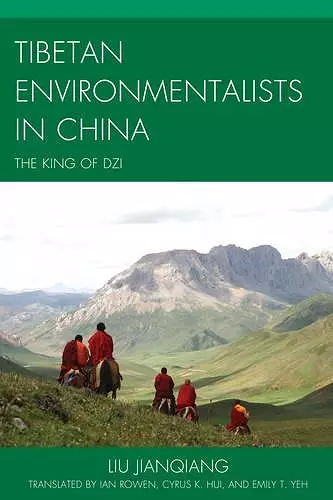Tibetan Environmentalists in China
The King of Dzi
Liu Jianqiang author Cyrus K Hui translator Ian Rowen translator Emily T Yeh translator
Format:Hardback
Publisher:Lexington Books
Published:24th Dec '15
Currently unavailable, and unfortunately no date known when it will be back

This book weaves together the life stories of five extraordinary contemporary Tibetans involved in environmental protection (as well as a host of secondary characters): Tashi Dorje, a well-known and celebrated environmentalist; Karma Samdrup, a philanthropist, businessman, and environmentalist; Rinchen Samdrup, Karma’s brother, another extraordinary environmentalist; Gendun, a painter, historian, and researcher from Amdo; and Musuo, a Tibetan from the Dechin area of northwest Yunnan who founded the Khawakarpo Culture Society. In the politically fraught and ever-worsening situation for Tibetans within China today, it is often said that the only possible path for a better solution will be through a change in the way that the majority Chinese society thinks about and understands Tibetans, their aspirations, histories, and desires. This book provides the first such account by drawing readers in with beautiful narrative prose and fascinating stories, and then using their attention to demystify Tibetans, cultivating in the reader a sense of empathy as well as facts upon which to rebuild an intercultural understanding. It is the first work that seriously aims to let the Chinese public understand Tibetans as both products of an admirable culture and as complex individuals negotiating religious ideals, economic change, and sociopolitical constraints. In short it opens up a whole new way of understanding Tibet.
In weaving together the life stories five extraordinary contemporary Tibetans involved in environmental protection, this book shows Tibetans as both products of an admirable culture and as complex individuals negotiating religious ideals, economic change, and sociopolitical constraints. In short, it opens up a whole new way of understanding Tibet. * Tibet Foundation Newsletter *
This book is a must read not only for scholars and experts interested in contemporary Tibet but for anyone concerned with environmental issues. The author addresses one of the most fundamental problems, which concerns the whole world: the ecological protection of Tibet, a country that became a colony of China in the 1950s and is currently facing the looting of its natural resources. He highlights the many difficulties met by environmentalists in China and especially Tibetans, and the risks they face, including long prison terms and even murder. This book also demonstrates that ecology is a field where Tibetans and Chinese can meet on an equal footing and work together in mutual respect. Nevertheless, their fight is far from over and recurring events show that Chinese authorities continue to trample their own laws and to destroy the Tibetan environment, without respect for its holy sites, its rivers, its pastures, or its land. * Etudes Mongoles & Sibériennes, Centrasiatiques & Tibétaines (EMSCAT) *
No writer in China today has done more to document environmental activism on the vast expanse of the Tibetan plateau. A superb storyteller and a keen observer of everyday life, Liu Jianqiang takes us on a journey in which we encounter histories of development, cosmologies of sacred landscapes, and activist struggles to protect animals, pastureland, mountains, and ways of life under threat. At once detailed ethnography, gripping travelogue, and probing investigative journalism, Liu shows us that the struggle to control the Tibetan plateau—its resources, religious practices, ecological systems, and livelihoods—is an incomplete project, never-ending, and fraught with danger. He convinces us that the struggle must include, whatever the future brings, the life lessons, visions, and voices of the Tibetan people. -- Ralph A. Litzinger, Duke University
Tibetan Environmentalists in China is a richly detailed, intensely personal account of the lives of Tibetans who stand at the forefront of environmental activism. It is simultaneously an account of the author’s journey from ignorance to a deep and compassionate understanding of Tibetan culture, including the religious beliefs, ritual practices, and everyday concerns that make Tibetan regard for nature a subject deserving of the sustained and careful attention that this book provides. Based on extensive interviews and site visits, the book is a fascinating, revealing, and at times troubling rendering of contemporary Han-Tibetan relations. -- Chris Coggins, Bard College at Simon's Rock
ISBN: 9780739199732
Dimensions: 237mm x 159mm x 30mm
Weight: 658g
350 pages